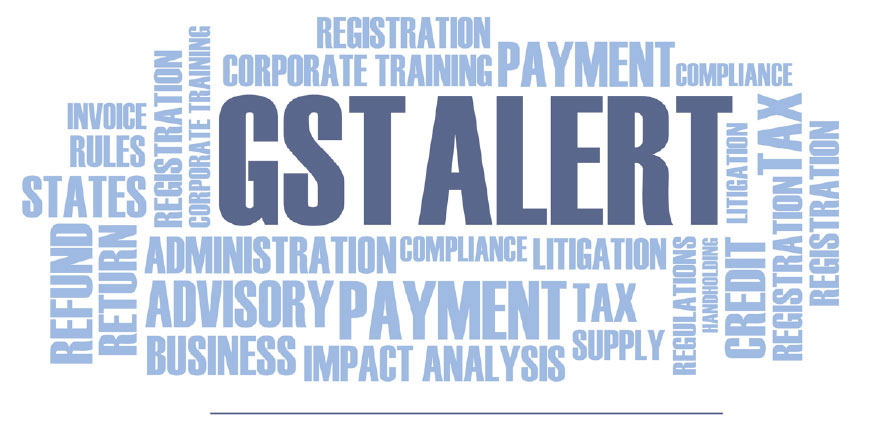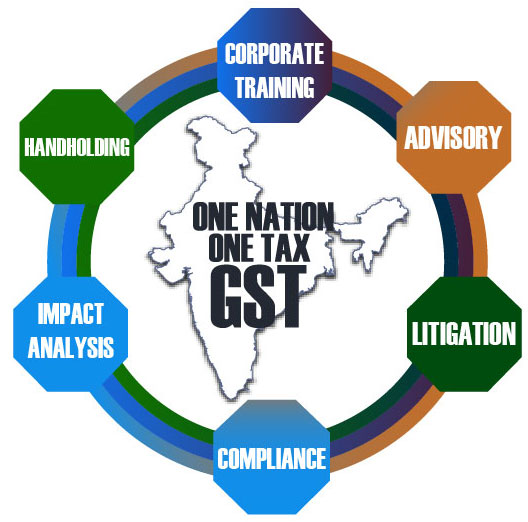Dated 8th August, 2020

Gujarat High Courts allows refund of accumulated input tax credit on account of "input service" under inverted duty structure 1
Facts of the case
The petitioner is engaged in the business of manufacture and supply of footware which attracts Goods and Services Tax at the rate of 5%. The petitioner procures input services such as synthetic leather, PU Polyol etc. Majority of input and input services procured by petitioner attract GST at the rate 12% or 18%. At the end, GST rate paid by the petitioner on procurement of input is higher than the rate of tax payable on outward supply of their product i.e. footware. After utilization of credit for payment of GST on outward supply, still there is accumulation of unutilized credit in electronic credit ledger of the petitioner. In the present case, Respondents are allowing refund of accumulated input tax credit of tax paid on inputs such as synthetic leather, Pu Polyol etc. It is to be noted that, tax paid on procurement of input services such as job work service, goods transport agency service etc. are not allowed for refund.So the petitioners have therefore challenged validity of amended rule 89(5) of the CGST Rule,2017 to the extent it denies refund of input tax credit related to input services.
Various similar cases2 were also pending in respect of the concerned issue, the same were disposed of by the below mentioned judgment.
Submissions on behalf of the Petitioner
It was submitted that if GST paid on inward supply is higher than the GST payable on output supplies, i.e. for supplies falling under inverted duty structure, government decided to grant refund as per the provision of Section 54(3) read with proviso (ii) thereto. Although the formula contained in Rule 89(5) for considering turnover of Inverted Duty Structure is understandable, the above said formula has restricted the refund to input tax credit on inputs only and not on input services.
Rule 89(5) of the CGST Rules of the CGST Rules defines a formula for calculating the amount of ITC refund due to the inverted duty structure. The provision of Rule 89(5) of the CGST Rules, 2017 as originally introduced was substituted vide Notification3 prescribing a revised formula for determining the refund on account of inverted duty structure which was given retrospective effect from 1.7.2017 vide another Notification4
Amended Rule 89(5) is reproduced below
“In case of refund on account of inverted duty structure, refund of input tax credit shall be granted as per the formula:-
Maximum Refund Amount = {(Turnover of inverted rated supply of goods and services) x Net ITC / Adjusted Total Turnover} – tax payable on such inverted rated supply of goods and services.
Explanation:- For the purpose of the above stated sub-rule, the expressions-
- Net ITC shall mean input tax credit availed on inputs during relevant period other than the input tax credit availed for which refund is claimed under sub rules (4A) or (4B) or both; and
- Adjusted Total Turnover” and “relevant period” shall have the same meaning as specified them in sub-rule 4
It is to be noted that, the net ITC in this formula is defined as input tax credit availed on inputs during relevant tax period. Although it does not see a mention of input services, on observing the rest of the components of the above formula, turnover and output tax refer to services as well.
Judgment of Honorable Gujarat High Court
High Court held that, the word “Input tax credit” is defined in Section 2(63) means the credit of input tax.
The word “input” is defined in Sec 2(59), which states that input means any goods other than capital goods.
Further Section 2(60) defines “input services” as any service used or intended to be used by a supplier.
“Input tax” under Section 2(62), means, tax charged on any supply of goods or services or both made to any registered person.
Thus ‘input’ and ‘input service’ are both part of ‘input tax’ and ‘input tax credit’. Therefore as per the provision of sub-section 3 of Section 54 of the CGST Act,2017, the legislature has provided that registered person may claim refund of “any unutilized input tax”, since Rule 89(5) of the CGST Act,2017 cannot restrict the claim only to “input” by excluding “input services” from the point of view of “input tax credit”. It is also to be noted that Sub-section 3 of Section 54 also refers to both goods and services and not only supply of goods as per amended Rule 89(5) of the CGST, Rules 2017.The respondent are therefore, directed to allow the claim of the refund made by the petitioners considering the unutilized input tax credit of “input services” as part of the “net input tax credit” for the purpose of calculation of the refund of the claim as per Rule 89(5) of the CGST Rules,2017 for claiming refund under Sub-section 3 of Section 54 of CGST Act,2017.
Our View
In the view of above discussion, the Hon’ble Court has rightly held that provisions contained in Rule 89(5)(a) of the CGST Rules are contrary to the provisions of Section 54(3) of the CGST Act and accordingly, refund of input services under inverted duty structure is allowed. Having said that, in all likely event, the department would challenge such decision before the Supreme Court. Moreover, it is also possible that relevant amendment can be made in the governing section with a retrospective effect to curb outflow of revenue. In the light of above, it is advisable to claim refund only under a situation wherein there is no utilization of input tax credit arising on account of input services, else, as a tax planning measure, refund of input under inverted structure and utilization of input services towards payment of domestic output liability may always be adopted
1 VKC Footsteps India Pvt. Ltd vs Union of India
2Lohara Steel industries Ltd. vs. State of AP
2Printers (Mysore) Ltd and another vs Assistant commercial Tax officer and others
2Willowwood Chemical Pvt. Ltd. vs Union of India
2Intercontinental Consultants & Technocrats Pvt. Ltd vs Union Bank of India
3Notification No 21/2018-CT dated 13.6.2018
4Notification No.26/2018-CT Dated 13.6.2018

BT Associates is a premier indirect tax consultant in kolkata, delivering high quality services to client in the area of indirect taxation.GST idea is a unit of BT Associates formed to share knowledge on stakeholders. We cover entire gamut from technical papers to recent development including IT under GST


-
Founder Member
- Bhaskar Thakkar
- Chief Executive officer
- BT Associates, India
- thakkar@btassociate.com
BT Associates is a premier indirect tax consultant in kolkata, delivering high quality services to client in the area of indirect taxation.GST idea is a unit of BT Associates formed to share knowledge on stakeholders. We cover entire gamut from technical papers to recent development including IT under GST






